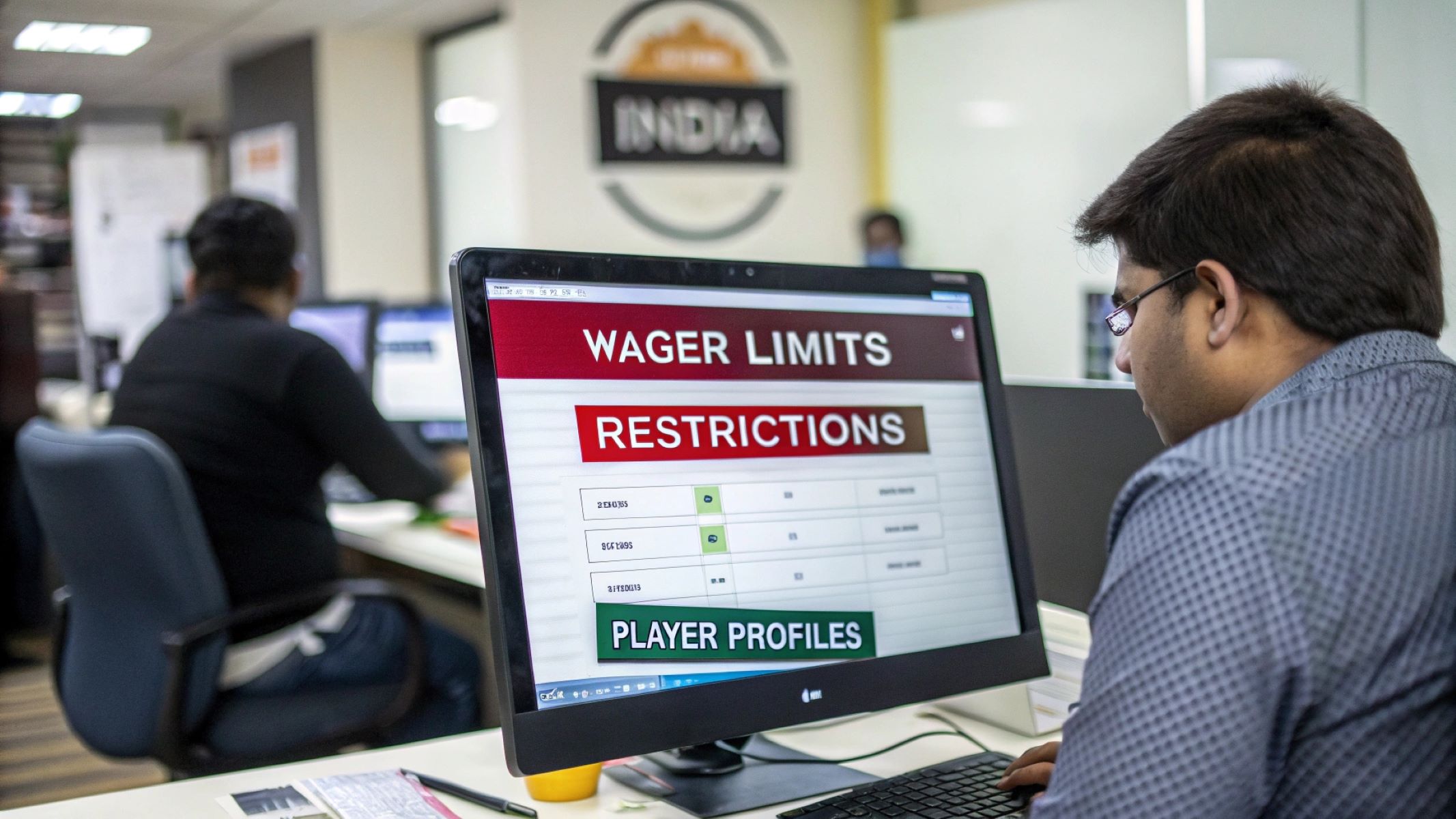If you’ve ever dabbled in online betting, you’ve probably come across the terms betting limits and restrictions. But what do these terms really mean, especially in the Indian context? Simply put, betting limits are the minimum and maximum amounts you can wager on a particular event, while restrictions cover a broader range of controls bookmakers use to regulate who can bet, how much, and under what conditions.
What Are Betting Limits
Betting limits act as essential guardrails within the betting world, especially in India’s fast-growing online gambling market. These limits set the minimum and maximum amount a player can wager on a particular event or market. By enforcing a minimum bet, bookmakers ensure that each wager contributes meaningfully to the betting pool, avoiding clutter from trivial bets. On the flip side, maximum limits are crucial to prevent any single bettor from placing excessively large bets that could threaten the financial stability of the bookmaker. This balance keeps betting fair, manageable, and sustainable for all parties involved.
Without betting limits, the system could easily become chaotic. Imagine a bettor wagering millions on a cricket match and winning — such an outcome could cause huge losses for the bookmaker and potentially disrupt the entire betting ecosystem. Moreover, betting limits discourage reckless gambling behavior by capping exposure and encouraging responsible play. These rules help maintain trust between bettors and bookmakers and create a safer environment for all.
Why Are Restrictions Important
Restrictions in the Indian betting industry serve as vital protective measures that safeguard multiple stakeholders, including the bookmaker, the bettor, and legal authorities. For bookmakers, restrictions are a way to control risk, prevent fraud, and ensure that their business operates within the boundaries of the law. For bettors, these restrictions provide safeguards against overspending and encourage safer gambling habits. By imposing limits and rules, bookmakers help create an environment where betting is conducted fairly and transparently.
Additionally, restrictions help comply with India’s complex legal framework, which varies from state to state. Since betting is a sensitive issue with potential social risks, restrictions serve as a layer of control to prevent illegal betting activities and underage gambling. They also reduce the risk of money laundering and fraudulent betting behaviors. Without these restrictions, betting could spiral out of control, causing harm to individuals and communities.
Overview of the Indian Betting Market
The Indian betting market is growing rapidly, fueled by increasing internet penetration and a passion for sports like cricket, football, and kabaddi. However, it is also characterized by legal ambiguity and a mix of regulated and unregulated activities. Domestic and international bookmakers compete to capture Indian bettors, offering various online platforms, betting options, and odds. Despite its growth, the market remains fragmented due to differing state laws and limited legal clarity, which affects how betting limits and restrictions are applied.
The rise of mobile apps and digital payment options has made betting more accessible than ever, with millions of Indians placing bets regularly. However, because betting laws have not kept pace with technology, many Indian bettors use offshore platforms, which come with their own risks and regulatory challenges. As a result, bettors must navigate a complex ecosystem where legality, security, and fairness can vary significantly.
Key features of the Indian betting market:
- Rapid growth fueled by internet and smartphone access.
- Popular sports include cricket, football, kabaddi, and horse racing.
- Legal ambiguity with some states regulating betting and others banning it.
- Dominance of offshore bookmakers catering to Indian users.
- Increasing use of digital payment methods like UPI, Paytm, and wallets.
Legal Landscape of Betting in India
India’s legal landscape around betting is complicated and varies widely between states. At the national level, the Public Gambling Act of 1867 prohibits most forms of gambling, but it does not explicitly mention online betting. This creates a gray area exploited by many online bookmakers operating offshore. Certain states like Sikkim and Nagaland have taken steps to regulate and legalize online betting within their jurisdictions, but these are exceptions rather than the rule.
Horse racing and lotteries are among the few legal betting activities allowed in many states. The lack of a unified national law leads to confusion for bettors and bookmakers alike. Law enforcement agencies often struggle to regulate and monitor online betting, especially when operators are located outside India. Consequently, bettors need to be cautious and ensure they are using reputable platforms that comply with local rules.
Important points on India’s betting laws:
- Public Gambling Act (1867) largely prohibits gambling but is outdated.
- Online betting exists in a legal gray zone with no clear national framework.
- States like Sikkim and Nagaland have legalized and regulate betting locally.
- Horse racing and lotteries are legally allowed in many states.
- Enforcement is difficult due to offshore operations and internet anonymity.
Popular Betting Platforms in India
Several bookmakers have emerged as favorites among Indian bettors, providing localized services, language support, and payment options. Betway is one of the most well-known international bookmakers with a strong presence in India, offering competitive odds on cricket and football, plus user-friendly apps. Another popular platform is 10Cric, which specifically caters to Indian bettors, focusing on cricket and local payment methods such as UPI and Paytm.
ComeOn is also gaining popularity by offering a broad selection of sports and live betting options, alongside responsible gambling tools. These platforms differentiate themselves not just by betting limits and restrictions, but also by the quality of their user experience, customer service, and promotions tailored for the Indian market.
Popular bookmakers and their features:
- Betway: International reputation, strong cricket focus, multiple payment methods.
- 10Cric: India-focused, UPI and Paytm support, wide cricket markets.
- ComeOn: User-friendly interface, live betting, strong responsible gambling features.
- Other emerging platforms offering competitive limits and localized services.
Common Betting Limits Set by Indian Bookmakers
In India, bookmakers establish betting limits to create a structured betting environment that protects both the bettor and the bookmaker. One of the most important limits is the minimum betting limit. This is the smallest amount a bettor can place on any wager. Typically, Indian bookmakers set this minimum bet relatively low, usually between ₹10 and ₹50. This low threshold encourages new or casual bettors to participate without feeling the financial pressure of risking large sums. It makes betting accessible to a wide audience, allowing everyone to experience the thrill of wagering without a significant upfront investment.
On the other end of the spectrum are the maximum betting limits, which vary widely depending on the bookmaker, the sport, and the specific event. For example, during major cricket tournaments like the IPL, some bookmakers may allow maximum bets exceeding ₹1,00,000 due to the high popularity and volume of bets placed. Conversely, for less popular sports or events with smaller betting pools, limits might be capped at ₹10,000 or ₹20,000 to control risk exposure. These limits help bookmakers manage their liability and ensure the betting market remains balanced and sustainable.
Another key aspect is the variation of betting limits by sports and events. Limits are not uniform across the board. Big-ticket events, such as IPL matches or international cricket games, usually attract higher betting limits due to the high betting volume and interest. In contrast, niche sports like badminton or kabaddi typically feature lower maximum bets, reflecting lower overall betting activity. Bookmakers adjust limits dynamically based on the popularity and risk profile of each sport or event to optimize their exposure and profitability.
| Type of Limit | Typical Range in India | Examples | Purpose |
| Minimum Betting Limit | ₹10 – ₹50 | Low stakes on cricket or football | Encourage participation by beginners |
| Maximum Betting Limit | ₹10,000 – ₹1,00,000+ | High stakes on IPL or international cricket | Manage bookmaker’s financial risk |
| Variation by Sport/Event | Higher for IPL & international cricket; lower for badminton, kabaddi | IPL (₹1,00,000+), Kabaddi (₹10,000) | Adjust to event popularity and risk |
Reasons Behind Setting Betting Limits
One of the primary reasons bookmakers impose betting limits is risk management. Bookmakers operate on thin margins, and an unusually large bet on an unpredictable outcome can cause significant financial damage. For instance, if a bettor wagers a huge sum and wins unexpectedly, the bookmaker could face substantial losses that might affect their operational viability. By capping how much a single bettor can wager, bookmakers mitigate this risk, ensuring they can cover potential payouts and continue to provide betting services sustainably.
Another crucial factor is the need to prevent problem gambling. Betting can be highly addictive, and unrestricted access to large sums can lead vulnerable users to chase losses or bet beyond their means. By setting maximum limits, bookmakers help protect these users, promoting safer gambling practices. Limits act as a built-in control mechanism, encouraging bettors to stay within their financial boundaries and reducing the social harms associated with gambling addiction.
Lastly, regulatory compliance plays a significant role in setting betting limits in India. Although the regulatory environment is complex and evolving, many Indian and international bookmakers operating in the Indian market adhere to responsible gambling standards to comply with laws and guidelines. These regulations often mandate that bookmakers implement limits to promote fairness and transparency. Complying with these rules helps bookmakers maintain licenses, avoid penalties, and build trust with their user base.




